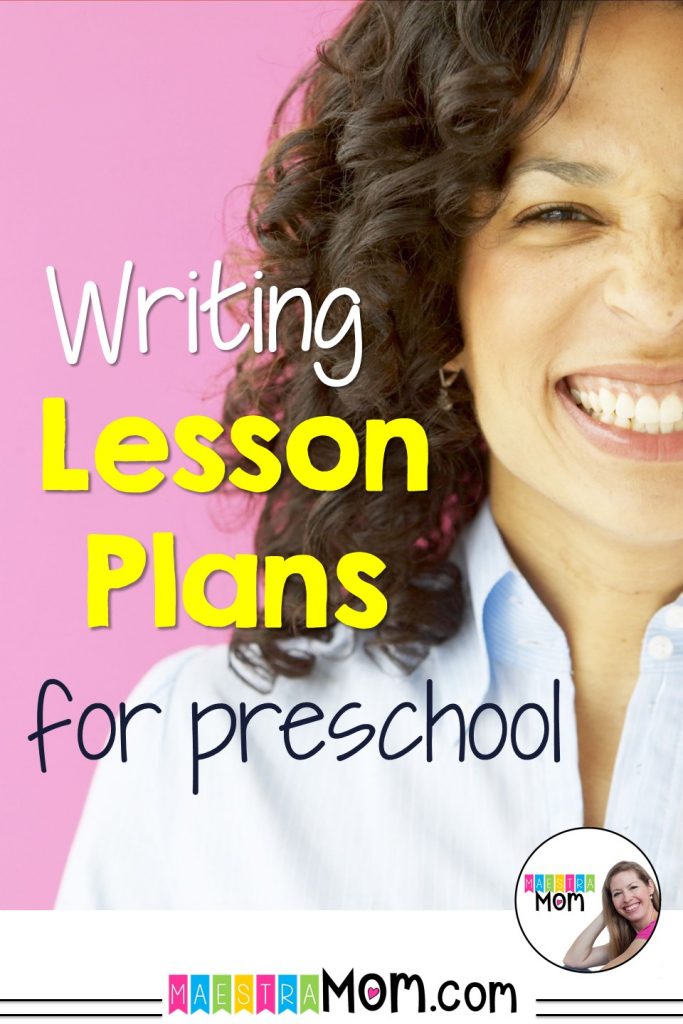If you are looking for how to write lesson plans for preschool or pre-k, you are in the RIGHT place!
Ahh, preschool! There is nothing more fun – or more intimidating! – than a classroom full of 3 or 4-year-olds! They are little inquisitive sponges that will keep you hopping…unless you keep them busily engaged with carefully crafted preschool lesson plans!
Great teachers know that instruction begins and ends with lesson plans. You may not always follow them to a T, but your plan provides you and your littles a structure for success!
How do you make lesson plans for preschool?
Creating lesson plans for preschool begins with using a good template, such as the one here. Then, there are several areas you need to consider in order to have a smooth, engaging day! Let me walk you through each step:
- Choose a thematic unit
- Choose great literature
- Consult pre-k guidelines
- Build a consistent routine
- Include Circle time
- Plan for Centers
- Plan for Small Group Instruction
- Be flexible!
- Collaborate
Use Thematic Units in your Preschool Lesson Plans
Young children learn best when all of their learning is linked together. Teaching in thematic units allow students to connect new knowledge in a way that makes sense of the information. A child can hear new vocabulary in the daily read-aloud, play with the language during whole-group activities, go deeper with the same information in small group interaction and then practice the new learning in centers. In this way, a child engages with new learning multiple times within a day!
According to Dr. Hurley and Dr. Blake of Early Childhood News, “an integrated approach is supported by research on how the brain works and how human beings learn. Ultimately, the use of thematic units helps young children achieve higher levels of learning.”
READ: Top 10 Social Emotional Picture Books for Children
Most preschool or pre-k thematic units last 1 or 2 weeks. Although units may sometimes vary from year to year, most preschool classrooms tend to share common themes…because they work! Popular thematic unit themes in preschool are topics of high interest to little kids that help them engage with the world around them and teach them about our society. Here’s a free list of themes I usually teach in my pre-k classroom.
Build your Lesson Plans around Great Literature
Whenever I sit down to write out a week’s worth of lesson plans, I always begin with beautiful literature. Lesson plans for preschool should always include at least one highly engaging read aloud book per day. If you have time and can do more than one read aloud each day, that is fabulous!
Many teachers plan for a read-aloud book in addition to a shared reading time. Shared reading is different, because it allows for more participation and interaction from the students – in essence, sharing the reading of the text. Since preschool children are just beginning their literacy journey, I use shared reading as an opportunity to focus on repeated Nursery Rhymes, Songs, Finger-plays, and Poems. If you do shared reading, just make sure you have a read aloud book somewhere in your daily schedule, too.
When teachers read to children, it builds a strong classroom culture of unity and promotes character development as you model how to think, wonder, and ask good questions. Students grow not only in language acquisition but also in social skills, imagination, and a greater understanding of the world around them.
What kinds of books should you choose? Well, I infuse a good dose of classics into my preschool lesson plans like the Three Little Pigs and the Three Little Bears. There are so many wonderful classic stories and fairy tales! Young learners love to participate in repetitive choral readings (like the refrain in The Gingerbread Man).
Choose your literature carefully because this will be the basis of your vocabulary instruction, literacy instruction, science, social studies, and sometimes even math! Good books help you integrate all aspects of your thematic unit for impactful learning!
Want Preschool Freebies? Click here.

Consult your Guidelines
As you are choosing your read-alouds for the week, carefully consider your guidelines and what academic objectives you will need to cover. In Texas, pre-k teachers follow the Texas Prekindergarten Guidelines to determine what topics need to be taught. In fact, all 50 states in the United States have developed some sort of standards or guidelines for early childhood care. Some school districts or daycares also provide guidelines that you may need to follow depending on your teaching environment.
In early childhood settings, kids need frequent repetition of core content in order to gain mastery over objectives. Don’t be afraid to teach things over and over! The best preschool teachers find ways to reteach objectives in the disguise of a new theme so that students can practice their learning and become masters of their knowledge!
After I have consulted the guidelines and chosen books, my next step in writing lesson plans for preschool is to use the read alouds to teach specific skills in science, social studies, or math. Usually, most thematic units are geared more towards science (like studying animals or seasons) or social studies (like a unit on holidays or famous Americans).
While the main academic focus in preschool in on language acquisition, many science and social studies topics are fascinating for students and a wonderful vehicle for growing that vocabulary and also integrating math instruction!

Start with a Good Routine
Your lesson plans for preschool can and should reflect your daily routine. You don’t have to reinvent the wheel every day! There should be chunks of your daily schedule that are repeated day-to-day with minor variations. This creates comfort, expectation, and a sense of control for your students! When you write out your lesson plan, think about the order that you teach in during the day and write out your plans to reflect that order.
READ: Pre-K Assessment & Kindergarten Readiness
My goal in preschool is to never have any activity last more than 15 minutes. So, if you have a 3-hour day, divide each hour into at least 4 chunks. A 3-hour day means I need a minimum of 12 planned chunks! Those chunks will include just the right mix of whole group, small group, and individual learning opportunities.
- Arrival
- Table-Top Manipulatives/ Puzzles
- Read aloud time
- Calendar & Math
- Circle time
- ABCs & phonics
- Thematic unit focus (science/ social studies)
- Centers
- Small Group Instruction
- Clean-up
- Dismissal
Include Circle Time in your Preschool Lesson Plans
I’m a big proponent of circle time or whole group time for preschoolers every day! In my classroom, I always include several chunks of time dedicated to whole class interaction. Intentionally, these chunks are sprinkled throughout the day so students are not sitting too long at any one time. This is when we do calendar and math instruction, ABCs & phonics instruction, read-alouds, and thematic science or social studies instruction – but not all at once!
I’m a floor teacher! One of my favorite features of the typical preschool classroom is THE RUG. I love the intimacy of the classroom family gathered together in a big circle instead of scattered far apart at desks. Gather your little chickies near you on the rug throughout the day and use this direct-teach time for new instruction or to review previous objectives.
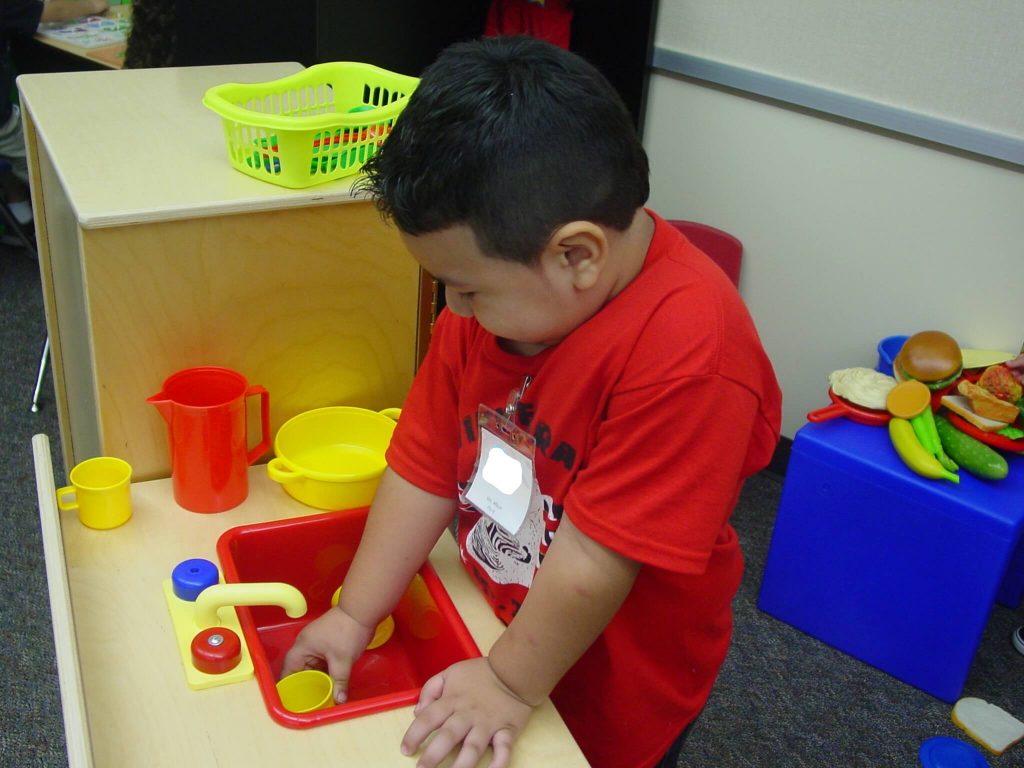
Plan for Centers in your Preschool Lesson Plans
In-between whole group activities such as Circle time, students need time in small groups or individually in order to practice their learning. When you make your weekly lesson plans, spend some time thinking about your centers and how you can integrate your thematic unit to create learning opportunities as they play.
Kids learn by playing.
Centers are a powerful way to provide opportunities to read, write, think, imagine, create, and apply learning.
In my lesson plans, I plan for the following centers each week and vary the activities within to reflect our learning goals within our thematic unit,
- Reading
- Writing
- Art/ Fine Motor Skills
- Dramatic Play
- Building/Blocks
- ABC
- Math
- Science
- Sensory Play
- Technology
Centers Freebie – Click here!
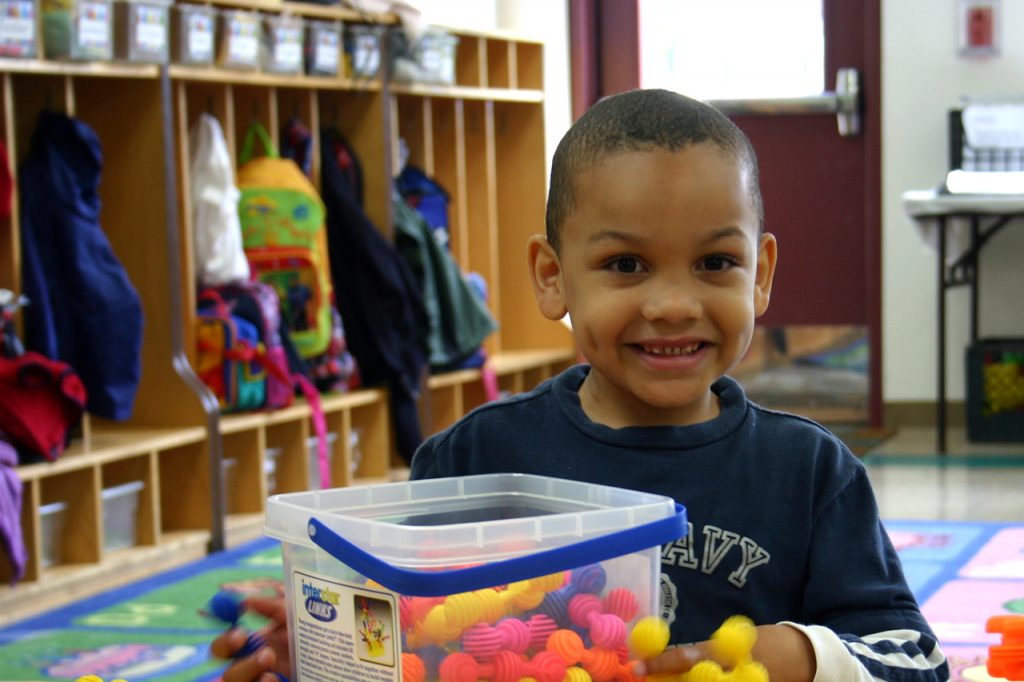
Target Small Group Instruction
One of my favorite things about doing daily centers with students, is that it allows me as the teacher opportunity to meet with small groups of students. In small groups of 2-4 children, I can differentiate their instruction! I can challenge and extend the learning of the kids that need it and take them deeper. For struggling learners, I can support, model, encourage, and reteach. Great teachers know small groups are the perfect chance to modify instructional methods to support different learning modalities, too.
When I do centers, I become one of the centers.
Students rotate to a new center every 10-15 minutes and come see me as part of their daily rotation. When I write my lesson plans for preschool, I target who is in each small group and what each student needs from me in order to be successful.
READ: Phonics in Pre-K
Leave Wiggle Room!
The one sure thing about pre-k? Your day probably won’t go exactly as planned! When writing lesson plans for preschool, allow for a good bit of flexibility! Wiggle room for YOU and for your students! You may find that you want to chase students’ interests in your daily dialogues or that teachable moments crop up. Seize them!
“The only good kind of instruction is that which marches ahead of development and leads it.”
Lev Vygotsky
One of my favorite inspirational teacher quotes is an old one from Lev Vygotskly from several decades ago, “the only good kind of instruction is that which marches ahead of development and leads it.”
A project you had planned for one day may end up taking 2, or 3. That’s ok! Write your lesson plans as suggested goal posts to provide direction for success, not as firm commitments. Show yourself and your students some grace when things don’t go according to plan!
When you write lesson plans for preschool, think of where your students ARE currently in their learning, and take it just ONE step further. You want your instruction to be just a bit ahead of them, enticing their curiosity, and leading them step-by-step into new worlds where they might not have wandered on their own.
And don’t forget to build in some true wiggle room for the kids, as well! Everyone will benefit from real movement!

Collaborate
Often, it helps tremendously to see or even use lesson plans from other teachers. When possible, collaborate with other preschool teachers! You’ll be sure to get new ideas, fresh content, and find out about books and internet links you might not have known about previously! If you get the chance, go observe others teaching, too!
In my store, I sell lesson plans that are bundled as complete thematic units with my top book suggestions, thematic center ideas, ready-made materials for centers, recipes, craft ideas, and more! Each lesson plan thematic unit also comes with a daily schedule for easy implementation.
Right now, I’m running an amazing promo of 25% off 10+ weeks of pre-made lesson plans and thematic units built around the Texas Prekindergarten Guidelines. This is an incredible deal and won’t last long. If you’re a preschool teacher, check it out here.
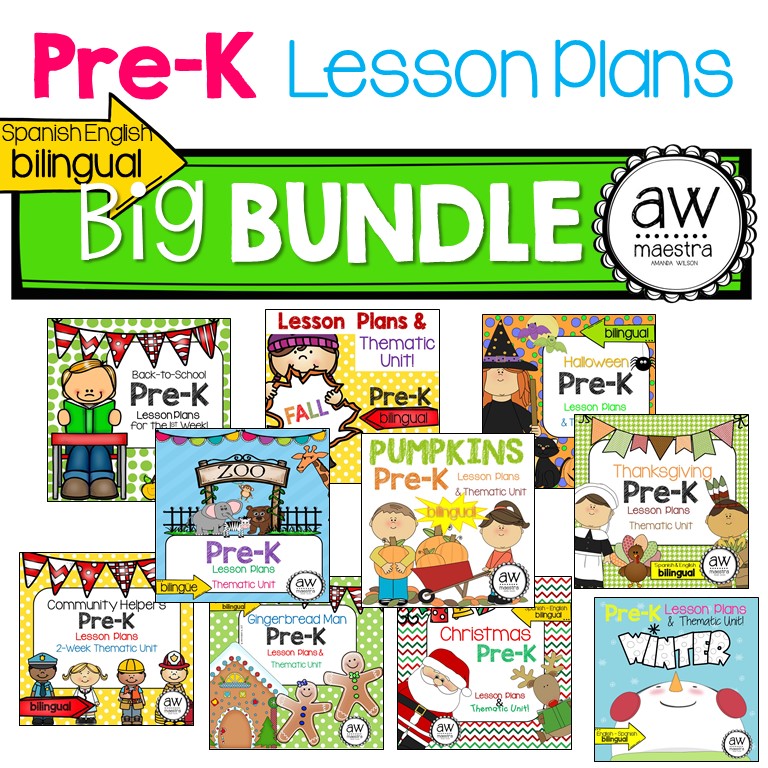
writing Lesson Plans for Preschool
Ok, let’s admit it, most of us teachers really kind of loathe writing lesson plans. It’s often the last thing we want to do after an exhausting day with our preschool babies. But, I promise you – writing engaging lesson plans for preschool kiddos is the key to amazing growth and lots of fun in your pre-k or preschool classroom! Grab your free copy of my preschool lesson plan template here, commit to some thoughtful preparation, and get ready for an incredible week of learning!
Happy teaching! Click now for your free Preschool Lesson Plan Template & Thematic Unit Yearlong List.
[mailmunch-form id=”920953″]
